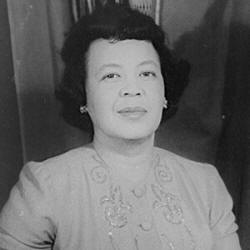 “Of the three wise men who came to the King/ One was a brown man so they
sing/ Alleluiah.” On December 10, The Cecilia Chorus of New York presents the
Carnegie Hall premiere of Margaret Bonds’s musically intriguing retelling of the
Nativity story, inspired by and dedicated to Martin Luther King, Jr., and first
performed in this fully-orchestrated version in 1960.
“Of the three wise men who came to the King/ One was a brown man so they
sing/ Alleluiah.” On December 10, The Cecilia Chorus of New York presents the
Carnegie Hall premiere of Margaret Bonds’s musically intriguing retelling of the
Nativity story, inspired by and dedicated to Martin Luther King, Jr., and first
performed in this fully-orchestrated version in 1960.
This moving nine-part cantata setting of Langston Hughes’s poem infuses classical structure with flavors of spirituals, jazz, and blues, creating a richly American harmony that is typical of Bonds herself.
A musical figure of the mid-twentieth century, Margaret Bonds was well known both for her work and for her strong presence. She composed her first piece at the age of five, and at age twenty, in 1933, she became the first Black woman to perform as a piano soloist with a major American orchestra. Among her many, many credits was the prestigious national Wanamaker Foundation Prize. She founded an art school and also taught music to many private pupils, including Ned Rorem, with whom she continued to play friendly duets long after he grew up and became famous in his own right. Zubin Mehta and the LA Philharmonic premiered her Credo for chorus and orchestra in 1972, shortly before her death at the age of 59.
In both music and life, she drew deep inspiration from her African American roots. Her father, a physician, founded an association for Black physicians excluded from the AMA. Her mother belonged to the National Association of Negro Musicians. Bonds’s rich settings of spirituals were commissioned for concerts by Leontyne Price and Marian Anderson. True to her deep commitment to the African American community, she helped establish such institutions as a Cultural Community Center in Harlem and the Harlem Jazz-mobile. She was a person of note in the artistic Harlem Renaissance of the 1930s as well as in the flowering of African American high culture that took place in Chicago.
It was as part of the vibrant Harlem Renaissance scene that she formed her lifelong connection with poet Langston Hughes. Several of her best-known works were settings of Hughes’s passionate poems, including The Negro Speaks of Rivers.
In The Ballad of the Brown King, Hughes and Bonds together created an arrestingly personal experience. In this cantata, as in all versions of the Christmas story, the kings come bringing the baby spices and gold -– but here the single most emotional line is the so simple yet so dramatic: “Of all the kings that came to call/ One was dark like me.”
After her death, Bonds suffered more than half a century of neglect, despite occasional performances or studies. Of the hundreds of pieces she created -- including art song settings of Robert Frost and Edna St. Vincent Millay, ballet and theater scores, symphonies and cantatas, arrangements for Louis Armstrong and Glenn Miller, songs for the Cotton Club cabaret and Tin Pan Alley, background music for movies and television -- only about 75 are extant. Her Easter cantata surfaced years after her death in a carton of sheet music near a dumpster. (It was performed at the Kennedy Center in 2018.) Because of copyright complications, her choral work Selma to Montgomery, which she composed in 1965 in honor of Martin Luther King, Jr., has never been performed.
But now her day has come -- or come again. Two years ago, The Dessoff Choirs, led by Malcolm J. Merriweather, recorded The Ballad of the Brown King in Maestro Merriweather’s orchestral reduction for strings, harp and organ. That album was named a WQXR-FM Best Classical Recording. The Metropolitan Museum of Art will present the Ballad (in Maestro Merriweather’s arrangement) as part of its Live Arts series in December 2021.
And for The Cecilia Chorus’s adventurous conductor Mark Shapiro, always on the look-out for unfamiliar composers, new and old, to showcase and champion, Margaret Bonds is a perfect fit. The Cecilia Chorus’s performance, by a 150-voice chorus with Bonds’s original full orchestration, will feature soloists Brandie Sutton (Met Opera), Joshua Blue (Met Opera) and Justin Austin (soon to appear in Intimate Apparel at Lincoln Center).
We believe Bonds would approve of The Cecilia Chorus’s December program. Just as she fused musical traditions and personal loyalties in original ways, from classical to folk and pop, so too Maestro Shapiro and The Cecilia Chorus of New York have become known for striking programming and pairing. Handel’s Messiah sung by The Cecilia Chorus is a Carnegie Hall tradition, but this year Handel’s 150-minute magnum opus has been condensed into a taut, exhilarating 50-minute “vest-pocket” Messiah. Handel and Bonds, old and new, making beautiful music together.
Nahma Sandrow sings with The Cecilia Chorus of New York.
